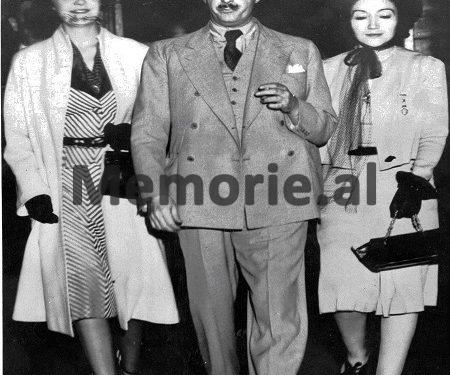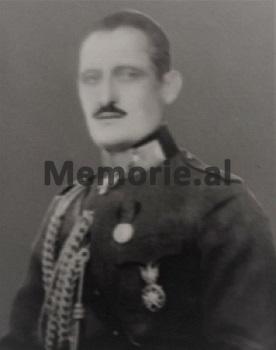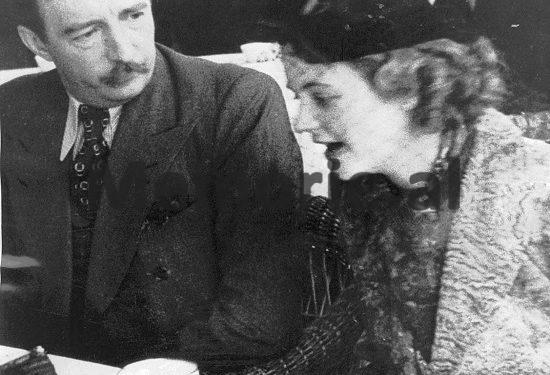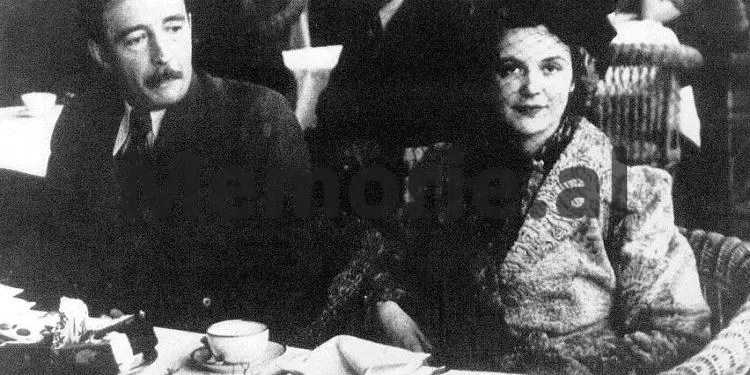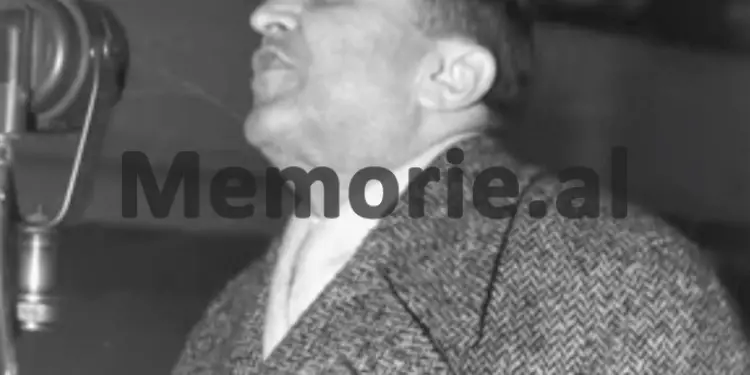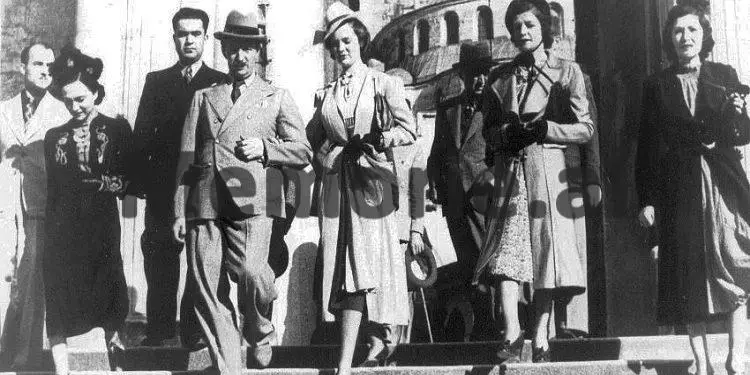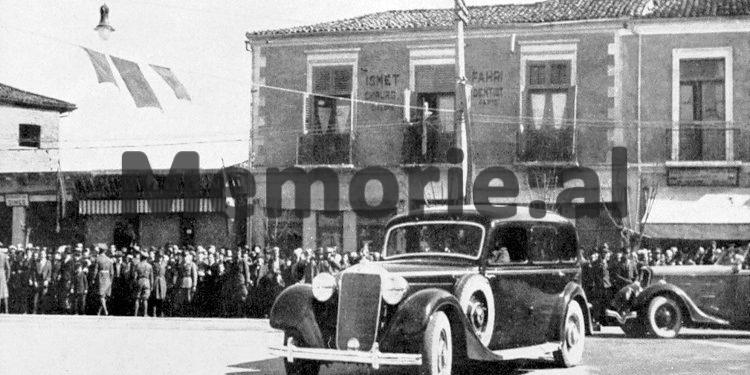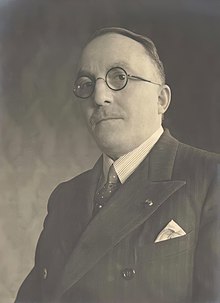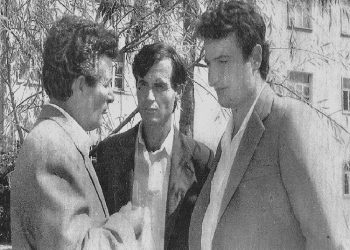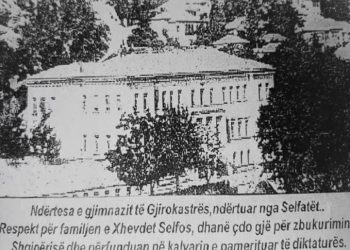By Hysen Selmani
Part fourteen
Memorie.al/ European and American press have often addressed the subject of the memories of the Albanian King, Zogu i-r, which he wrote and dictated during his exile from Albania. Considering the notes and syntheses that his assistant, Colonel Hysen Selmani, compiled over the years in his service, – always, next to the King of the Albanians, both at home and in exile, these notes, more or less with parts of detached, without strictly following the usual criteria of memoirs, and without having the definite, final form of an edition, they are prepared by Hysen Selmani himself, who has dedicated most of his life, as in Albania, as well as during the exile, serving the First Zog, the King of the Albanians.
Continues from last issue
Larisa, on April 16, 1939
King Zog ordered the Minister of Foreign Affairs, Ekrem Libohova, to call our minister in Ankara, Asaf Xhaxhuli. He, in the name of the King, should appear before the President of the Turkish Republic, His Excellency, Ismet Inonue, and tell him that; King Zog, with the Royal Family and Government, wishes to remain in Turkey. This too should be done as early as possible.
The Minister of Foreign Affairs, Ekrem Libohova, immediately called the minister, Asaf Xhaxhuli, and communicated the order he received from the King. Minister Xhaxhuli replied that: “Today I have to appear in the Palace, I will present to the President of the Republic, His Excellency, Ismet Inonue, and tomorrow I will present the answer to you”. Minister Xhaxhuli added that: “The Turkish Government took the decision to recognize the Albanian Royal Legation and does not recognize the Italian occupation.” He communicated this to me officially.
Our minister in Ankara, Asaf Xhaxhuli, presented to the Foreign Minister, Ekrem Libohova, and said: “Now, the Turkish Prime Minister, Shyqyri Saraxhollu, communicated to me that; The President of the Turkish Republic, Ismet Inonue, invites his Majesty, King Zog, with his entire family and the Albanian Royal Government, with as many people as they wish, to come to Turkey and the Turkish land, to consider it a second Homeland. .
Larissa, April 28, 1939
Prime Minister Koço Kotta informed the Greek Government that; His Highness, Zogu I, together with the Royal family and the Government, his suite, on May 1, 1939, will leave for Istanbul – Turkey. The Greek Prime Minister, Metaksai, sends a letter to the Prime Minister of the Albanian Kingdom, Kotta, where he says: “His Majesty, Zog I, King of the Albanians, His Majesty, King George II, has made available to you the wagon of him, to Istanbul, as a friend of King Zog. He wishes him a good journey, and bright successes, for the generous and brave Albanian Nation”.
Athens April 29, 1939
Metaxas
Prime Minister of Greece
Larisa, May 1, 1939
Istanbul, May 3, 1939 – 2 am
On May 3, 1939, at 2 o’clock in the morning, we arrived in Sekerçi – Istanbul, where we were received by the minister, Asaf Xhaxhuli, the Albanian Consul, Hajrullahi, Valiu of Istanbul and Police Midiri of Istanbul and the entire Albanian colony in Istanbul.
All the accompanying personnel were arranged in the hotels that were reserved and dispersed. There at the “Pera – Palace” hotel, only myself and Minister Asaf Xhaxhuli remained, and we started talking about the Turkish situation, vis-a-vis King Zog.
The king, at 9 o’clock, was up and dressed. He had gone out to the living room of the apartment, drinking coffee. Then, he asked who was downstairs and they told him that it was the colonel with Asaf. He immediately called us upstairs and we were talking with Minister Asaf. The latter was explaining everything, what Turkey had done, as well as its attitude against fascist Italy. The King ordered us to go to visit Vali and Police Midri, in the name of the King, thanking him.
Istanbul, May 17, 1939
The Ministerial Council, at 10 o’clock, met to examine all those telegrams and letters that came from all parts of the world, to give you some encouraging answer. Also, the complaints of the personnel in Turkey, Yugoslavia, and Greece were studied, in order to help you, until some way of support is found. Likewise, the expenses of the Legations were also studied to give you an amount, of course, not as their budget was, but much less, because they still do not have any income from the colonies.
The Ministerial Council, after carefully studying and considering the situation of the personnel, as well as of the Legatees and, taking into account the extremely small state of the treasury, decided:
- Legation in Turkey 6 months 002.000 000.000
- Legate in France 6 months 001.000 000.000
- Legation in Egypt 6 months 000 800 000.000
Amount to be sent to Legates: 004.000 000.000
- Personnel in Yugoslavia 000.000 004.000
- Personnel in Turkey 000.000 002.000
- Persons in Greece 000.000 001.000
Amount to be sent: 000.000 007.000
The current cash balance is: 008.000 032.000
Removed with today’s payments: 004.000 007.000
This amount remains in the treasury: 004.000 025.000
The Ministerial Council, taking into account the urgent needs of the Legations, as well as the personnel difficulties in Turkey, Yugoslavia and Greece, decided on the payment noted above. Of course, the appointment of Legates, for six months, is little. But, within this, they need to be administered, until the funds are found. This, as we will see in this table, the financial situation in the state coffers, does not allow more. Very small, it was assigned to the personnel urgently, like in Yugoslavia, Turkey and Greece. This small help was provisional, enough to meet the urgent needs. And this amount was sent through banks.
Istanbul, May 31, 1939
King Zog, in important talks with Colonel Hysen Selmani, had instructed them exactly, regarding the talks he would refer with the Yugoslav Government. This, to explain to the Serbs in detail, Mussolini’s intentions towards Yugoslavia and Greece and at the same time, to regulate the personnel, with the help of the Yugoslav state. His Majesty, King Zog, having finished his talks with Colonel Hysen Selman, giving him all the instructions, they parted, and the colonel went and saw the Queen and the Crown Prince.
And accompanied to the train station by the minister Asaf Xhaxhuli, and by the Speaker of the Parliament, Hiqmet Delvina, he left for Skopje, Yugoslavia, where all the officers and emigrants who were in Yugoslavia were notified. Colonel Hysen Selmani, on June 2, 1939, in the morning, arrived in Skopje. At the station, he was welcomed by Murat Kaloshi, Aqif Lleshi, Himçe Kaba, Mehmet Ali Bajraktari, Major Abaz Kupit, Major Murat Basha, a Major of the Garrison, Professor Mustafa Gjinishi, Hasan Reçi, Abedin Çiçi, Captain Avni Deralla, and many officers of civilians.
It was a number of almost more than 200 people. There, after greeting everyone, they got into cars and went to the “Bistol” Hotel, where the accommodation was reserved. There, after drinking coffee and finishing the talks, Colonel Hysen Selmani, accompanied by Major Murat Basha and Captain Avni Deralla, went to the Skopje Army Command to pay a visit to the Army Commander, General Nedel Kovicic. There he was received with respect, quite friendly. This is because they were friends and acquaintances before, and in the few talks that took place, they understood that the army did not agree with the Government. Yes, to talk longer, they left it for the next day. At this time, Colonel Selmani took permission and went out, while the general took him to the gate and said: “We are friends and tell me everything openly, because you have my adjutant, major, at your disposal.” Then, they said goodbye and left.
Colonel Selmani went directly at 11 o’clock to Bani, the Governor of Skopje, to pay him a visit. This one received very well. Then he took her by the arm and they went to the living room. While talking, the tragedy of April 7 was touched upon. He told the colonel that: “This time, we missed to come to your aid, common interests, and we are fully to blame.” But time will tell the reason. He was aware that I was going to visit the Albanian emigrants and told me: “Please, as a friend, let me know about any need. I have given the order to be free everywhere”. I thanked him and then we left. He walked me to the gate, very sincere.
Since it was late to visit the Police Commissioner, I sent Captain Avni Derralla to inform him that: In the afternoon, I would like to visit him, me and Major Murat Basha. With the Yugoslav major, I went to the hotel, because that’s where everyone was waiting. At that place, I called Prince Jelal Zog and asked him how he was. I told him that I will come in the afternoon to see him. When he told me: “No, I will come to the hotel now, to see you”, and he really came. As we greeted each other, we went to the bakery, where almost more than 60 people, ate lunch and talked.
After we finished lunch and talked, at this time, I would go, as I had planned, to the Police Commissioner, to visit him, because he was waiting for me. I took Captain Avni Derralla, we went. He received us very friendly. He was Montenegrin; he knew a little Albanian and we talked at length. While, when I got up to go out, he generously put his arm around me and told me that; I will leave a police commissioner at your disposal, who also knows Albanian. I thanked him, but I told him that; The commander of the Army has left me a major and it is not necessary”.
“No, no,” he told me, laughing, “he does it for himself and I do it on Ban’s order and, of my own accord.” Then we said goodbye and left. On this day, at 6 o’clock in the afternoon, the Commander of the Army, General Nedel Kovicic, and the Chief of Staff of the Army, General Kovacevic, comes to the hotel. We received them very well and gave you a drink each. And we talked about many things. This was completely contrary to the Government and to General Nedić, as Minister of War. I also had him as a friend, but he spoke very badly about him, and told me: “If we didn’t have this Government, on April 7, Fascist Italy would not have been able to land on Albanian soil. But it would resemble that time in 1934, when King Alexander was alive, because the same Mussolini program has been. Well, every Yugoslav understands this, and this, very soon, will come to our gates”, etc.
With these quite sincere conversations and others, we continued. Then I told the Serbian soldiers that: “Tomorrow I want to go to Gostivar, to see the Albanian immigrants. And when I return, I will let you know that if you find the time, I want to talk about immigrants, officers and civilians”. He told me: “Very good. Here, where do you have the major with you, if you wanted something else, tell me”. Then, he added: “When you want, come to the command, because I am a friend and I love you and even, I will ask you about His Majesty, King Zog, because he knows me well. I have the same sympathy with my King. I have had many talks with His Majesty. Major Iliçin, I have put him at my disposal”, etc. With these words, we escorted him to the car, said goodbye and left.
On June 4, 1939, the colonel went to Gostivar. All the officers, professors, civilians, more than 800 people were there. I had with me Murat Kaloshi, Aqif Lleshi, Himçe Kaba, Major Murat Bashe, Haxhi Lleshi, Captain Avni Derralla, Major Yugoslav, Professor Mustafa Gjinish and several others. When we arrived in Gostivar, the captain, Hamza Drini, captain, Shyqêri Baftjari, captain, Shaban Tirana, Professor, Abedin Çiçi, Professor, Mustafa Gjinishi and Myftar Kaloshi and Captain Sali Llanin were waiting for us. The task was to compile a list to make you a payment for six months. Lieutenant Qemal Shtino was the secretary. On this day in particular, we had ordered 60 roast lambs and, a few other things that we all had a picnic lunch together.
This is how the list was compiled; I gave you a sum of money, 6 months’ salary, but in napolona paper. They were very happy and at dinner, after we said goodbye to them, I told you that: “I will not leave without treating you well. I will see you often. So, we went to Skopje”.
SKOPJE, JUNE 5, 1939
At 12 o’clock on this date, when I was talking with all the people in charge of immigration, the Governor, along with the Chief of Staff of the Army, General Kovačević, came to the “Bristol” hotel. They have returned my visit on this occasion. We received them very well and very friendly, as well as laughing. Then they told me: “How did your friends, immigrants, do?” Were they pleased when they saw you”? Then the Governor added to me that: “Don’t worry at all, that measures will be taken to help them, as soon as possible, both for the officers and for the civilians.” Then, we had other talks. We stayed until 1:00 p.m., but they were very satisfied and, asking for permission to go out, added: “For anything, we are ready to fill them in.” We escorted them and came out with this opportunity.
As it was now bread time, we went to the bakery. We were together with all those responsible as officers, Pari and professors, etc. As soon as we started the bread, Professor Mustafa Gjinishi and Lieutenant Ibrahim Farka came to me and told me: “We have a telegram from some 15 students who have remained in Qaf-Prush”. Immediately, I told Captain Avni Derralla and Professor Mustafa Gjinishi: “Yes, when 4 pm comes, go to the Governor and make arrangements so that they are allowed to come to Skopje by train.” The expenses are ours.”
“Okay, – they told me, while we were in other talks, on the form of an organization. As for dinner, I had Myslym Peza and Neim Starova. These were together with Professor Mustafa Gjinish and Lieutenant Ibrahim Farka. They were going to Albania and so both of them, in all the programs, agreed with this. Immediately after the bread, these two would leave for Ohrid and Struga, Tirana, where some actions undertaken would be carried out.
I was regularly connected by phone with Istanbul, with the “Pera Palace” Hotel. I talked about everything and letting you understand that, I have all the facilities, more than we thought. This will not only provide assistance to the immigrant staff, but will also allow me to organize work. Yes, of course, always secretly, and after three days, I would go to Belgrade. I informed more than 16 students of the Technical School, who were under the care of Professor Mustafa Gjinishi.
After that, I called all those in charge, both officers, Pari, and young professors, at the “Bristol” Hotel: Aqif Lleshin, Murat Kaloshin, Mehmet Ali Bajraktarin, Major Murat Bashan, Professor Mustafa Gjinishin, Captain Avni Derralla, Captain Shaban Tirana , Captain Hamza Drinin, Captain Shyqëri Baftjarin, Agronomist Abedin Çiçin, Jusuf Selmanin, Jashar Lela, Sali Llanin, and Professor Stavro Bojaxhina.
With these, a conversation was held about the possibilities of a work organization for what we need. To be connected as best as possible, with the internal elements. So that we don’t lose hope of a quick victory, for the liberation of the homeland. But of course, this organization should be completely secret, without falling into the eyes of the enemy. This would not only cause protests against Yugoslavia, but would also bring a lot of damage to the internal element. Because an event could break out before time and the place where we were could take measures and stop us. For this purpose, I have discussed and to some extent they have allowed me the way in which this action should be done. Completely inconspicuous. Moreover, even in the country where we are, the organization was discussed like this.
SKOPJE JUNE 6, 1939
After much discussion of the study in detail, it was liked by all. More appropriately, it was a useful activity in terms of emigration to Yugoslavia. It was decided in this way of operation. He would be in three different centers. And each center is responsible for the program and organization that belongs to it. As we are noting this below:
A.- Military Center:
Will be responsible to liaise closely, with all officers, as you will be assigned the program, from time to time. Every action is kept in the greatest secrecy, so that in no way, it does not fall on the ears of the enemy, nor of the country.
– Center of intellectuals:
This center should be closely related to all the teachers and students they know. It is about those who have no contact with the service of Fascism. These contacts will be made on the basis of a program with institutions, successively. Provided that, nothing falls into anyone’s ears
– Center of Paris
It will be closely related to the Kreshnik officers, but on condition, only for those who know them well. And, do not be in the service of the enemy, with great caution. Because if one of the three is understood, all three are damaged and we remain in a bad situation. These were responsible for being elected by the commission that met in Skopje, under the chairmanship of Colonel Hysen Selmani, on June 6, 1939. The heads of the operation centers for Valievo were: Colonel Kuçuk Ullagaj.
For Skopje, it was Aqif Lleshi and Professor Mustafa Gjinishi. These accepted the development of the work, based on a program, which would change according to the situation. They took over the entire progress of the works. On the other mirror, the centers around the border are marked. After the suitable and capable element was selected in the operation centers, in full harmony with each other, they accepted all the responsibilities of the actions, based on the program. Memorie.al
The next issue follows




